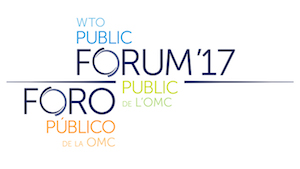Expectations of and possibilities for the MC11 in Argentina
27 Sep 2017 15:30h - 17:00h
Event report
[Read more session reports from WTO Public Forum 2017]
In this working session, panellists shared their insights on the 11th WTO Ministerial meeting (MC11), which will be held next December. The Our World Is Not for Sale (OWINFS) network and the Third World Network – Africa (TWN Africa) jointly sponsored the session. Ms Deborah James, Director of International Programs, Centre for Economic and Policy Research (CEPR), moderated the panel.
H.E. Mr J.S. Deepak, Ambassador and Permanent Representative, Mission of India to the WTO, was the first speaker. Deepak concentrated on the topics of agriculture and e-commerce. He stressed the importance of food security to G33 countries, maintaining that trade openness and addressing hunger can go hand in hand. Concerning e-commerce, he observed that developing countries lack a mandate for initiating negotiations. Their exclusion from the discussion causes the trade community to confuse the benefits of e-commerce with the benefits of rule-making for e-commerce within the WTO. Therefore, although e-commerce may be beneficial to developing countries, their absence from negotiations means that their small and medium sized enterprises (SMEs) are open to exploitation. This point also reflected a criticism of the WTO, in regards to special and differential treatment, and where ‘everything remains skewed in favour of the developed world’.
Mr Edward Bizumuremyi, Commercial Attaché, Permanent Mission of the Republic of Rwanda to the United Nations Office and other international organisations in Geneva, held that, along with food security, the greatest issue to African countries is that of the deindustrialisation caused by old trade agreements. For this reason, he defended the need for domestic support in not only the manufacturing sector, but also in agriculture (which provides over 80% of jobs in Africa). Similarly, Africa has opposed recent proposals in e-commerce, such as the free flow of data, no localisation requirements, and no disclosure of source codes as they are ‘set to have a devastating impact’ on industrialising efforts. African members of the WTO see them as a disguised manoeuvre by other members to have a mandate in e-commerce. Claiming their need to have a digital industrial policy, the African group rejects those proposals and calls for the maintenance of the 1998 Work programme on electronic commerce.
Ms Aileen Kwa, Coordinator, Trade and Development Program, South Centre, focused on the Doha agenda and on its importance for developing countries. If the discussions advance, they will be able to reduce the disparity of agricultural subsidies between themselves and advanced economies that have existed since the General Agreement on Tariffs and Trade (GATT). Likewise, inequality can also be observed in the newer topic of e-commerce. Beyond the issues of domestic disparity caused by automation and international disparity owing to the digital divide, there is also a rift regarding the proposals to regulate e-commerce. On the one hand, there is a group trying to promote rules such as the free flow of data within the WTO. This would signify a complete opening of national digital spaces, which would further both digital divides, domestic and international. Conversely, there is the path proposed by the 1998 Work Programme, which instructs members to analyse e-commerce issues in light of previous agreements. This model captures the original WTO spirit of strategic liberalisation, and therefore would be the recommended choice.
Ms Vahini Naidu, Counsellor, South African Permanent Mission to the WTO, criticised the trend that encourages members to submit their regulatory procedures to WTO oversight. This restricts the space governments have for developing sectors for strategic objectives, while also threatening to extend their obligations to issues where no commitments have been made. Pertaining to e-commerce, proposals such as the free flow of data and no localisation barriers may not necessarily contribute toward development. First, because global e-commerce is a highly segregated market, dominated by six countries. Second, because although wider digital transformations are important, they are very disruptive, as shown by the protests against Uber in South Africa. Automation will also mean job loss and loss of government ability to address the issue through innovative policies. Since countries have already had difficulties in developing infant industries before, to advance a digital industry without the ability to domestically regulate it will be impossible.
In the Q&A that followed, the panellists addressed criticism of the ‘lack of pragmatism’ that came from their being a ‘one-sided panel’. James suggested that providing food security and better livelihood to almost a billion people should be regarded as progress.
by Guilherme Cooper Vicente
Related event

